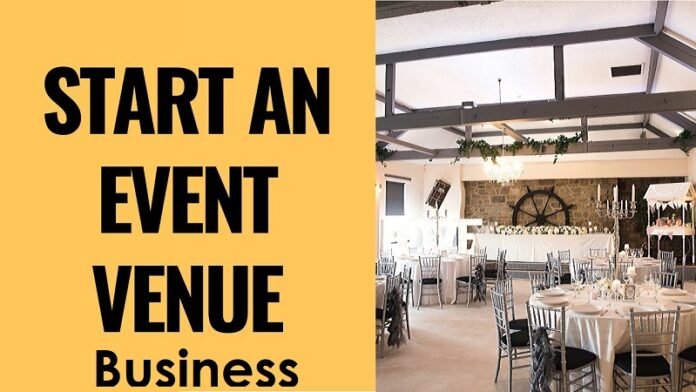In 2020, the worth of the global event industry was about US$890 billion. Statistics forecast a possible growth of 2/3rd of this value by 2030.
So, if you want to hop on into the event venue business, you need to know the basics. You need to know what attracts and impresses your target audience the best. Keep reading for more!
1. Research and plan location
Clarify your vision for the event venue business. What types of events will you host? What unique features will your venue offer? Set specific goals for the business’s growth and success.
Study the event industry in your area, analyze competitors, identify market gaps, and understand the needs and preferences of potential clients.
Research potential locations for your venue. Consider factors such as foot traffic, accessibility, nearby amenities, and the overall vibe of the area.
2. Perform all legal formalities
Choose a unique and suitable name for your event venue business. Check with your local business registry to ensure the name is available and register it with the authorities.
Obtain all necessary permits and licenses like health permits, alcohol licenses, fire safety clearances, and more.
Opt for necessary insurance coverage to protect your business. Consider registering trademarks to protect your intellectual property if you have a unique logo, business name, or branding.
3. Analyse finance
Estimate all the expenses of starting your event venue business, including venue setup, decor, equipment, marketing, permits, licenses, insurance, and more. Be thorough and realistic in your budgeting.
Determine how you’ll finance your business – whether using personal savings, loans, investments from partners, or investors.
Hire an accountant or use any accounting software to manage your books, record expenses, and generate financial reports. Determine how you’ll price your venue rental and other services.
Negotiate with vendors for favorable terms, discounts, or payment plans when sourcing equipment, decor, and other supplies.
Allocate a portion of your profits to reinvest in your business, like venue improvements, marketing efforts, or service expansion.
4. Research catering partners
Partner with reputable catering companies that align with your venue’s style, target market, and event offerings. Look for one that has connections with wholesale food suppliers for fresh food and drinks with a strong track record and positive reviews.
Remember, quality food is important to help your business grow. So, double-check where you source the freshest ingredients.
To avoid manual work in order, choose a software-oriented ingredient ordering platform.
Schedule meetings with catering companies and food supplier representatives to discuss partnership opportunities and benefits.
Arrange a menu-tasting session where the catering team can showcase their culinary offerings.
Discuss the terms of the partnership, including revenue sharing, exclusive catering rights, and any discounts or incentives you can offer each other’s clients.
5. Decide on a design and set up
Decide the style, theme, and ambiance you want to convey to clients. Create a layout plan that optimizes the use of space.
Consider factors like seating arrangements, stage setup, dance floor, restrooms, entrances/exits, catering area, counter space, storage, and access to utilities for food preparation and serving.
Divide your space into functional zones for different aspects of the event, such as reception, dining, entertainment, and lounging areas.
Select complementing furniture and install high-quality audio and visual equipment.
Before hosting events, conduct test setups to ensure that all equipment, lighting, and decor elements function correctly.
6. Build a network and client relationship
Become a member of event planning associations or chambers of commerce in your area. These organizations offer networking events, workshops, and online communities to connect with industry professionals.
Partner with event planners and coordinators for client referrals in exchange for incentives. Organize your venue’s open houses and guided tours for event planners, potential clients, and the local community. Make them experience your space firsthand.
Share high-quality photos, videos, and success stories from events hosted at your venue on various social media platforms.
Create a professional website that showcases your event venue, services, amenities, and contact information. Share testimonials, photos, and details about past events there.
Collaborate with local media outlets, bloggers, and influencers to get featured articles, interviews, or reviews about your venue. Positive media coverage can increase your visibility.
Conclusion
The path of starting an event venue business may be challenging. But with careful planning, perseverance, and a customer-focused approach, you can create a thriving venture that adds a touch of magic to life’s most special occasions.
Don’t forget to follow up with clients to gather feedback and express gratitude. Keep improving, and you’ll reach the top in no time!
Read Also: Colleen Ritzer and The Murder Case, Some Fascinating Details






























































